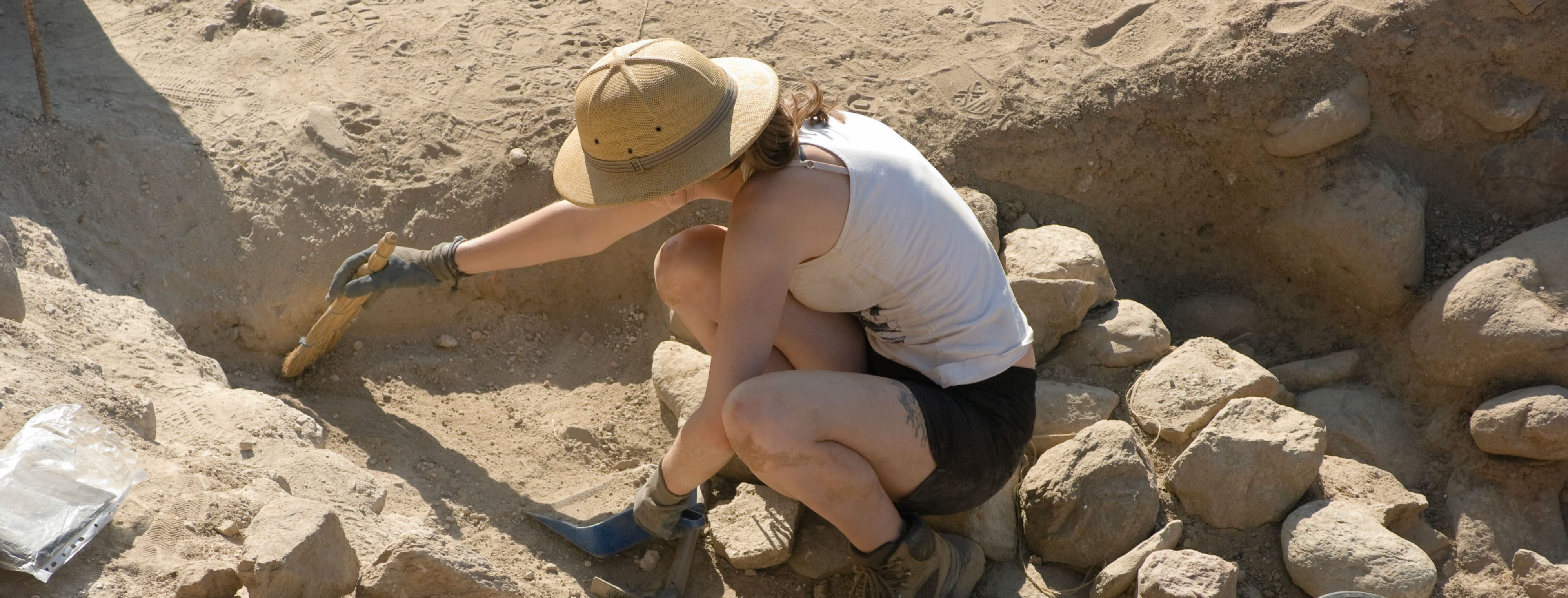Why You Should Study Archaeology
Archaeology is the study of the ancient past. Through excavations and fieldwork, archaeologists uncover the material remains of past civilizations and piece together the clues to create a picture of how these people once lived. It can be considered as a part of the social sciences or as a branch of the humanities and draws from a wide range of disciplines, including history, sociology, linguistics, art history, anthropology, and many more. So if you're interested in writing (or rewriting) a few pages of ancient history, here's what you need to know about studying archaeology.
- Education

Archaeology is the study of the ancient past. Through excavations and fieldwork, archaeologists uncover the material remains of past civilizations and piece together the clues to create a picture of how these people once lived. It can be considered as a part of the social sciences or as a branch of the humanities and draws from a wide range of disciplines, including history, sociology, linguistics, art history, anthropology, and many more.
One of the earliest pioneers was John Aubrey. Way back in the 17th century, he became the first person to systematically excavate sites of historical interest, including Stonehenge and other megalithic monuments in England. Since then, archaeologists have traveled from continent to continent and found evidence of some truly amazing cultures.
So if you're interested in writing (or rewriting) a few pages of ancient history, here's what you need to know about studying for a Ph.D. in archaeology.
Understand cultures from all over the world
If you're interested in learning about different cultures, both past and present, then enrolling in an archaeology program might be the beginning of a great adventure. Broadly speaking, archaeology students study the lives of ancient humans by examining the remains of early settlements all over the world. This gives us a glimpse into the past, allowing us to understand how different groups lived, expanded, and, in some cases, perished. These discoveries can often shed light on how our own societies came to be, providing crucial evolutionary links to our not so ancient past.
Once you've earned your degree, you could find yourself digging through the Indian subcontinent, where previous excavations uncovered the Indus Valley Civilization which flourished between 2600-1900 BC. Alternatively, you might find yourself sitting in a cave on a small, remote Indonesian island, staring at images that were painted over 30,000 years ago! Or why not travel to the ancient Egyptian pyramids and try to rewrite history as we know it? And who knows, you may even discover a piece of it for yourself.
But whether you're digging in a faraway tropical paradise or somewhere a little bit closer to home, you're guaranteed to stumble across some amazing objects and make fascinating discoveries on what shaped and defined these ancient cultures.
Uncover the mysteries of the past
Indiana Jones, the world's most famous (fictional) archaeologist, was not only an academic and an adventurer, but also a detective tasked with uncovering the mysteries of the past. And Hollywood isn't the only place where the lines between the archaeologist and the detective start to blur. Many leading academics have highlighted the parallels between the two professions, and it's easy to see why. Like those hard-nosed criminal investigators, archaeologists search for evidence and analyze the clues before coming to their conclusion. They often work on hunches and try to understand the reasons, or motives, for why early humans acted in certain ways or held specific beliefs.
It was this investigative approach that led one team to discover the legendary lost city of Ziklag in southern Israel, believed to be where King David (the same David who defeated Goliath) took refuge from his enemies. Ancient DNA samples and carbon testing of artifacts from the site have also raised many interesting questions on several more Old Testament stories, including Exodus, a founding myth of the Israeli people.
And if you really want to go deep into the origins of the world as we know it, then book a plane ticket to Egypt. Egyptology is a branch of archaeology and history that asks some of the biggest and most fascinating questions. Among the more traditional ideas about the pyramids, you will find more adventurous theories like the Orion correlation theory, which posits a correlation between the three largest pyramids in Giza and the stars in the constellation Orion's belt. Other sites, like the Sphinx, suggest a knowledge of the universe that was way beyond (or so we typically assume at least) the technology of the time. This has led the more imaginative archaeologists to suggest the Pyramids may have been built by a race of people yet to be discovered, or even from beings beyond the stars! Sound outlandish? Of course it does! Only there are plenty of Egyptian hieroglyphics that bear a striking resemblance to rockets, spaceships, and, dare we say it, UFOs? But if all this is just too absurd for your tastes, then you can use all your archaeological skill to disapprove the theories and bring us all back down to earth!
It’s loads of fun
When it comes to higher education, we often find ourselves getting caught up in the most serious aspects. And while focusing on things like student loans, long-term career projects, and getting those top grades is always important, it means we can forget about another crucial element of learning -- that it should be engaging, exciting, and, most of all, fun! After all, if we remember why we love doing the things we do, then we inevitably start doing them even better.
It can be very difficult to make interesting finds in archaeology. In some digs, you can just be unlucky. But there are some great artifacts to be found! Take for example, the recent story of Caroline Coolidge, a second-year archaeology student who was taking part in a summer archaeology program run by Pontifícia Universidad Católica del Perú in collaboration with the Harvard Summer School Study Abroad Program. Digging at San José de Moro, the site of one of the oldest ceremonial grounds for the Moche, a pre-Columbian civilization which lived in northern Peru between the first and eighth century A.D., Caroline had not really found anything and was feeling a little "discouraged"... but then hit upon an amazing, fully-intact figurine, approximately 1,000 years old!
"I honestly at first just thought I was imagining it because I just wanted to find something so bad," she said. "I thought, "This can't be this intact piece of pottery." But I just kept brushing away. I was honestly speechless when I saw what it was." "I knew [the experience] was going to be amazing. But I didn't realize it was going to be this amazing." Gary Urton, a Harvard professor of Pre-Columbian Studies, said, "[The artifact is] one of the most complete and beautiful figurines we have brought up from here in several years."
After growing up with a fascination with ancient culture and adventure, Lawrence Shaw enrolled in a BSc degree in archaeology at Bournemouth University in the UK. Like any degree, there was plenty of hard work and long, lonely hours in the library, but studying archaeology also provided Lawrence with fun-packed moments and some unforgettable experiences. When asked about his time at uni, Lawrence said, "As a practical, hands-on person, this particular degree suited me down to the ground. Within the first week of our studies, we had jumped onto a minibus and headed out into the landscape to investigate a range of archaeological monuments, from deserted medieval villages in Dartmoor [in Devon] to Europe’s largest Iron Age Hill Fort, Maiden Castle."
More of Lawrence's undergraduate adventures included several major archaeological projects, including an excavation at the iconic Stonehenge and surveys on Easter Island, the site of over 900 ancient statues called Moai carved by the Rapa Nui people between 1250 and 1500 CE.
You can build an amazing academic career
You super fans should already know this, but for those who don't, the full name of Indiana Jones is actually Dr Henry Walton Jones Jnr. In the original adventure novels published in the 1990s, we learn all about Dr Jones' background, including his time as a young post-doctoral research student at the University of Chicago. So way before he started raiding lost arks or tracking down the holy grail, young Indy would have spent hundreds of hours in the lab studying his finds from far less exciting field trips.
To apply for a PhD in archaeology, you'll need an undergraduate and postgraduate degree (preferably with top grades in both), as well as loads of enthusiasm, dedication, and commitment. It takes up to four years to earn a doctorate, during which time you will do much of your work independently, although you'll still get plenty of support from the academic staff. This kind of in-depth study requires excellent organizational skills, including time management, the ability to prioritize workloads, and hitting those deadlines.
Caroline Spry is a PhD archaeology student at the University of La Trobe, Australia. She splits her long weeks between fieldwork and office-based research, which involves examining artifacts and samples or writing up her thesis chapters. And like most PhD students, Caroline quickly learned the importance of finding an enthusiastic and supportive academic adviser who appreciates the nature of your work.
So if you're thinking about a PhD, do as much research as possible on the university, including the archaeological faculty members. Look for someone whose work or expertise crosses over with you own and contact them for an informal chat to find out if they would be willing to support you through your studies.
Your archaeological studies might not be quite as exciting or as extraordinary as those of Indiana Jones or Lara Croft (aka Tomb Raider), but they’ll certainly be much safer! What’s more, you’ll likely get the chance to visit some amazing places, go digging through our ancient past, and maybe even find something that changes the way we think about ourselves forever...
Find your perfect program
Use our search to find and compare programs from universities all over the world!
Archaeology
Ashley Murphy
Author
After graduating with a degree in English literature and creative writing, Ashley worked as a bartender, insurance broker, and teacher. He became a full-time freelance writer in 2016. He lives and writes in Manchester, England.
Find a program in these categories


